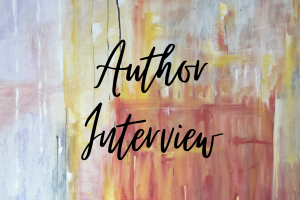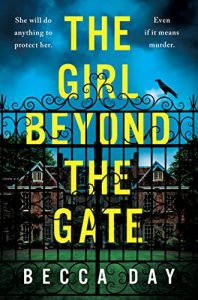Blurring the Lines: An Interview with Becca Day
 This author interview series has allowed me to virtually meet so many authors, many who write psychological thrillers. And author Becca Day falls into that camp. Her debut, The Girl Beyond the Gate, releases in two weeks, and readers are enjoying it immensely. Early reviews call the book everything from “twisty and unputdownable” to “a rollercoaster ride of a story” and one reviewer wrote, “it is the type of book that demands your attention, the type of book you can’t stop thinking about when you dare to do something else, like sleep.” What fantastic praise! Becca continues to write, so if you enjoy her work, you’re in luck. And while I did not get a chance to ask her about her cocker spaniel (what was I thinking?), my guess is he’s a huge part of Becca’s support system. Like every author I have interviewed, Becca juggles multiple roles, especially with a launch right around the corner. So I’m grateful for her time and attention.
This author interview series has allowed me to virtually meet so many authors, many who write psychological thrillers. And author Becca Day falls into that camp. Her debut, The Girl Beyond the Gate, releases in two weeks, and readers are enjoying it immensely. Early reviews call the book everything from “twisty and unputdownable” to “a rollercoaster ride of a story” and one reviewer wrote, “it is the type of book that demands your attention, the type of book you can’t stop thinking about when you dare to do something else, like sleep.” What fantastic praise! Becca continues to write, so if you enjoy her work, you’re in luck. And while I did not get a chance to ask her about her cocker spaniel (what was I thinking?), my guess is he’s a huge part of Becca’s support system. Like every author I have interviewed, Becca juggles multiple roles, especially with a launch right around the corner. So I’m grateful for her time and attention.
Christina: Congrats on the publication of The Girl Beyond the Gate, Lauren North wrote that it’s “tantalisingly toxic. A fantastic debut with an OMG ending!” What do you find so compelling about psychological thrillers? How difficult is it to come up with a unique concept?
Becca: I’ve always been interested in psychology in general. I love dissecting why people do the things they do. My favourite antagonists are never just bad for the sake of being bad. They have layers. They wholly believe they’re in the right. Similarly, my favourite protagonists are those who also do bad things and make mistakes. I love blurring the lines and finding that grey area between good and bad, and I think psychological thrillers lend themselves really well to this. It’s a saturated market so coming up with a unique concept can be tricky, but I do believe that every idea has already been done before. No idea is completely unique. It’s the way in which you tell the story that’s unique.
Christina: The novel takes place in a community built around a converted psychiatric hospital. Where did the idea of using a psychiatric hospital come from? How much research did you have to perform? Did you find anything surprising?
Becca: I had it in my head that I wanted to set this story in a gated community, as I loved the idea of it being considered a really safe place to live and then having this tragedy occur within the gates. It was only when I started researching that I realised they’re far more common in America than England. The gated communities in England tend to be these restoration projects where they turn old abandoned buildings into housing. Instantly I started getting even more excited about the idea. I thought the concept of the community having some kind of dark past built into the walls would make for the perfect creepy setting, so I started brainstorming different origins and landed on a Victorian psychiatric hospital.
Christina: Hannah Smith, Editorial Director of Embla Books said, “Becca has masterfully woven a story full of tension.” Tension is something that writers often have to insert during the revision stage. Did the tension here arise organically when you were drafting, or did you make a conscious effort to place it after the first draft? Do you think a story could ever have too much tension?
Becca: I definitely think a story can have too much tension. It’s a delicate balancing act. You want the story to allow the reader to breathe and experience those emotional beats, but not slow the pace down. For me, each chapter I write needs to move the story forward and have some kind of conflict that the character is up against. This doesn’t always have to be a life or death situation—conflict could mean an internal struggle or being faced with a situation that makes the character uncomfortable. I think about this when I’m plotting, again when I’m drafting, and yet again when I’m editing. I’m always asking myself “What is the point of this chapter? Is it progressing the story? Is my character facing some kind of conflict? Does it cause them, and the reader, to ask more questions?”
Christina: You used to write for a parenting website. How did that experience shape you as a writer? What is one of the greatest lessons you’ve learned from it?
Becca: In both The Girl Beyond the Gate and the second book that I’m currently writing, I focus a lot on motherhood and the struggles that can come from being a mother. I think a lot of that has come from speaking to so many mothers over the years while I’ve been in that job and then becoming a mum myself. It automatically ups the stakes, because in whatever situation you’re dealing with you don’t just have yourself to think about, but a child too. That’s not to say I’ll always write characters who are mothers, but certainly at the moment they’re one of my favourite types of character to explore.
Christina: In another life, you also studied acting. Did you intend to become a professional actor? Does acting inform your writing at all? Have you or would you consider writing screenplays?
Becca: I did want to be a professional actor, but it only took me a few years of venturing down that path to realise that I’m not really cut out for the industry. There is so much competitiveness and being judged on things other than your talent, whereas I’ve found the writing community to be one of the most wholesome, supportive groups of people. That being said, I don’t regret studying acting for one moment. To act, you need to be able to explore your character’s wants, needs, and why they do what they do—a skill that transfers perfectly to writing fiction. I also spent a few years running a murder mystery theatre troupe, which is what kick-started my love of crime fiction. I’m not sure if I’d ever write a screenplay—I think it’s a very different and specific skill—but I do see all of my novel scenes play out in my head like a movie!
Christina: Along with author William Shaw, you run Reading Parties. For those who might not know, what are Reading Parties, and what is your mission?
Becca: Reading Parties were, like many virtual events, born out of lockdown, but people have said they’ve enjoyed the community and accessibility so much we’re planning to continue for as long as there’s still interest! Essentially, we get together with a bunch of readers and an author on a Zoom call and read an excerpt of the book together. Unlike a traditional book reading, it’s a real group effort as opposed to just listening to the author read. Each attendee gets their small paragraph to read. It’s a joy to watch it all come together with all the different accents and takes on the story. There’s then a Q&A with the author and a virtual book signing. They’re such lovely, intimate events, and everyone is always so supportive even if you’re shy!
Christina: Do you believe in writer’s block? Why or why not? Do you have any tips for those who might experience it?
Becca: I kind of have to believe in it. I face it every time I try to draft a novel! For me, it usually comes around the 40-50% mark. I feel like I’ve done so much, but then the prospect of writing that many words again is extremely overwhelming, and I just sort of shut down. I’ve found the shower is a miracle worker! If I’m stuck or can’t think of where to go next in my novel, I take a shower and allow my mind to play the story out as if it were a movie. I don’t know what it is about the shower, but it always unlocks the best ideas for me!
Becca can be found in multiple places!
Website: https://beccaday.com/
Twitter: @authorbeccaday
Instagram: @authorbeccaday
Facebook: @authorbeccaday
Thanks to Becca for agreeing to this interview! If you know of an author who’d like to be featured in an interview (or you are an author who would like to be featured), feel free to leave a comment or email me via my contact page.

